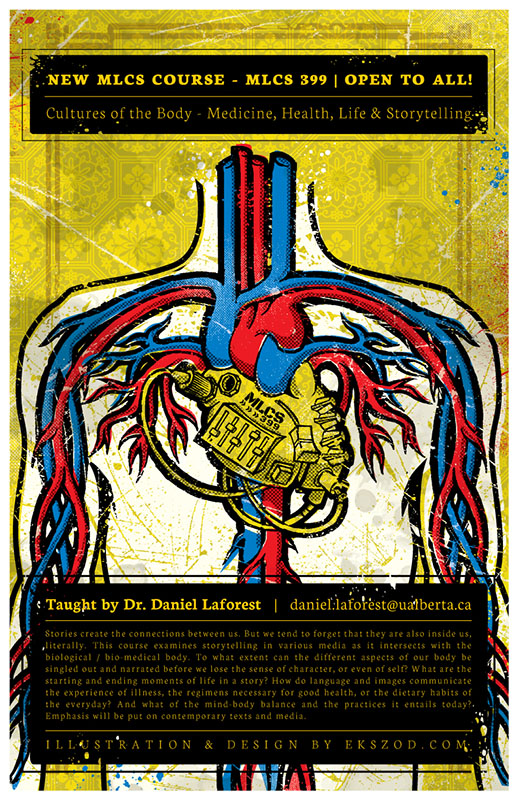
Daniel Laforest believes that all humans are born storytellers: that it's not just a talent - it's a compulsion. His new course,Cultures of the Body-Medicine, Health and Storytelling (MLCS 399) examines this compulsion in detail, looking at the ways health science practitioners, as well as those experiencing illness, form and create narratives around the body.
The course falls within the broader discipline of health or medical humanities, a growing field that, according to Laforest, an Associate Professor in MLCS, promises to raise as many questions as it answers. Increasingly, with advances in medical science, individual components of our body are isolated for study and treatment, which may affect our perception of an integrated "sense of self." It's that loss of connection and the narrative around it that interests Laforest.
"You break down the body into its various constituents and you lose the 'oneness' of that we tend to associate de facto with our body. Once it's broken down, you have a million possible stories in there, and how do you connect them all? I feel like that may be one of the central problems of our time, especially for the humanities."
Laforest cites the popularity of holistic wellness practices like yoga and mindfulness as examples of our attempts to re-establish a sense of "oneness." Storytelling, says Laforest, particularly within the field of medicine, is a natural response to our experiences. However, its expression is as varied as the individual, encompassing fiction, nonfiction, poetry, the visual arts and other media. The course will examine and reflect on these responses, drawing on writers such asVincent Lam, a Giller Prize winner and practising doctor, as well as other contemporary texts.
Cultures of the Body is attracting students not just from MLCS, but from anthropology to psychology, which Laforest believes will not only enhance the discourse but profoundly shape future iterations of the class. "If it's only people from the narrative arts, we're not going to go far," he says. He even sees community art/geolocation projects as a possibility for the future, with additional collaboration across disciplines, faculties and communities in an effort to uncover and promote points of connection through storytelling.
The core theme of the class - the cultures of the body - also suggests a broad reach, connecting stories beyond our own immediate physical experience to the experiences of our ancestors. "With family history, when you start looking at what failed in your body, oftentimes you'll say, oh well that's my genes," says Laforest. "You've got stories that are larger than your own living timeline, like Russian nesting dolls."
The need to tell our stories, whether we are a doctor, a patient or an undergraduate in a classroom, is a deeply human experience. How we tell that story, and perhaps most importantly, why we are compelled to tell it, are questions that Laforest will address in the course. "I want students to realize the importance of storytelling, not only at the university, but in everyone's life; to be able to reflect on that importance in ways that they did not suspect, in ways that I did not suspect and in ways that reach outside the confines of campus."
The deadline for registration in MLCS 399 is August 23, 2016.